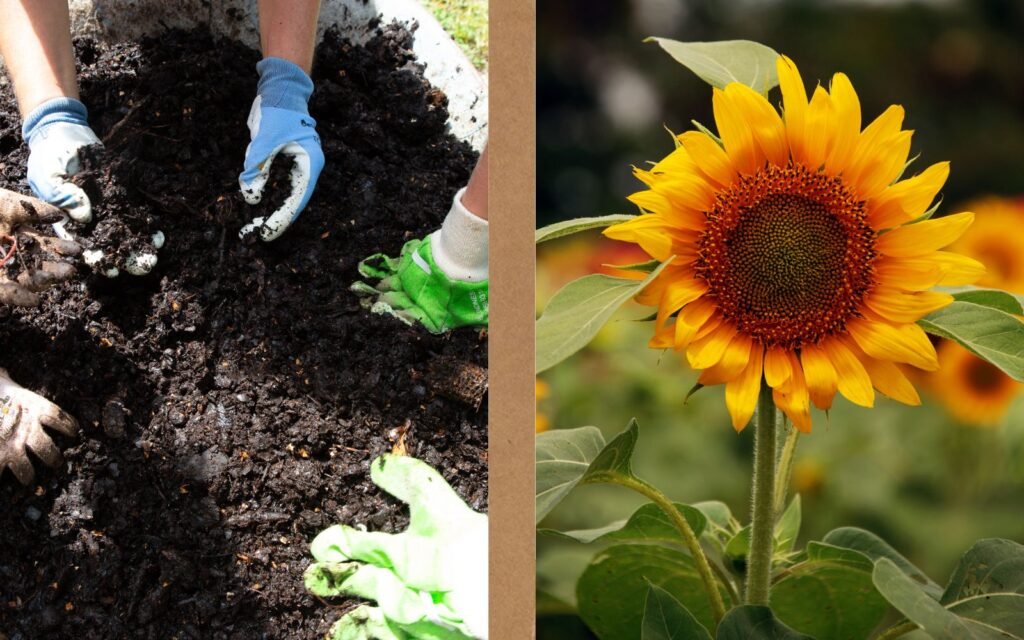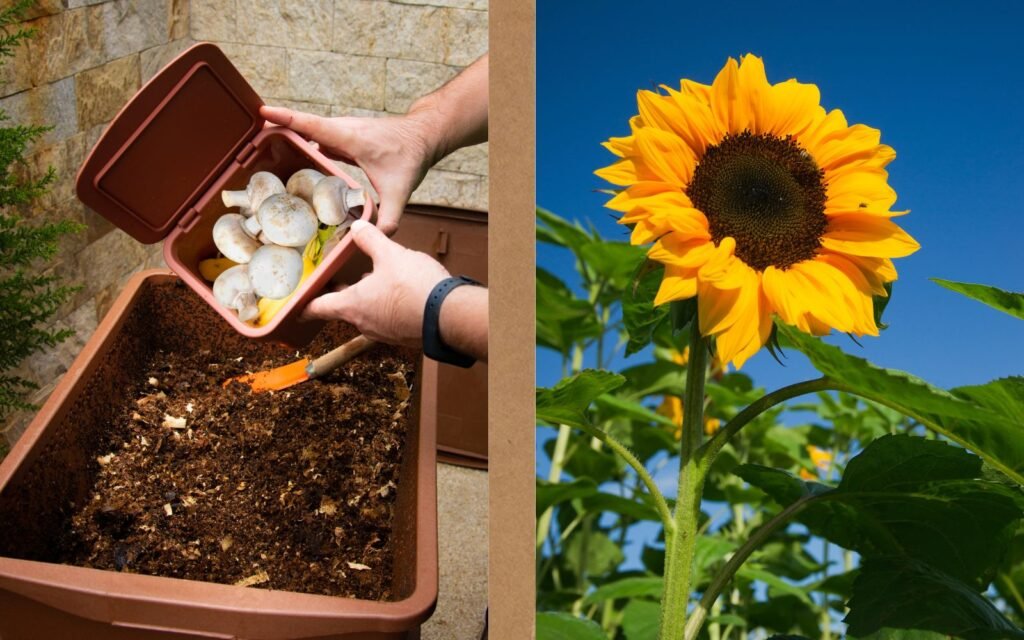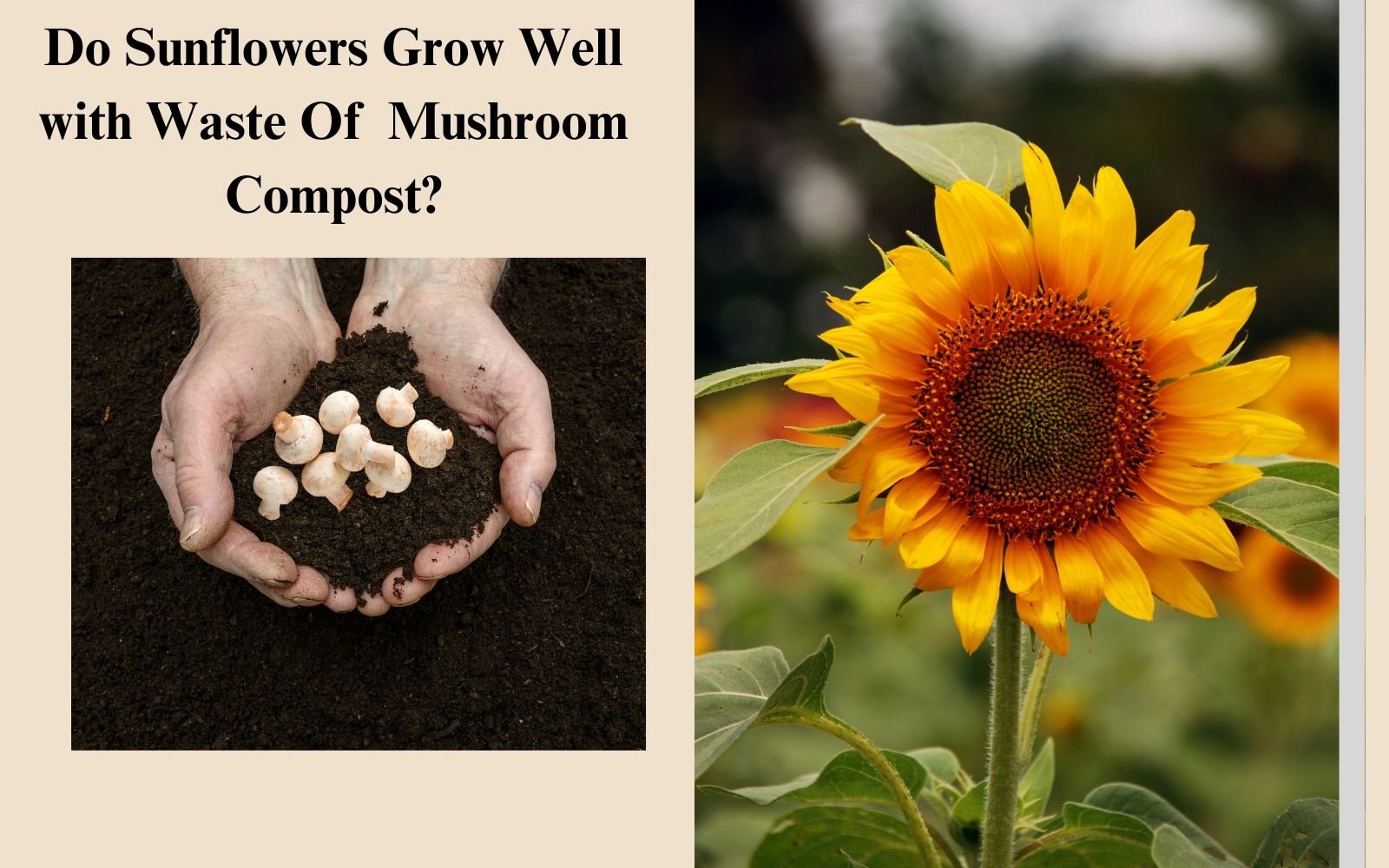Sunflowers (Or Helianthus) are a favorite in many gardens because they are bright and easy to grow. But to grow them well, it is important to use the right type of soil and compost. One option to consider is mushroom compost for sunflowers. It’s a type of organic compost made from a combination of several materials, like straw and poultry litter.
Yet, you need to consider some environmental conditions before growing or maintaining the plant. These conditions further include soil, watering, sunlight, temperature, and pests. Mushroom manure helps to improve soil structure and provides essential nutrients. Moreover, it enhances moisture retention but can be both alkaline and high in salts as well.
Table of Contents
ToggleHow To Make And Use Mushroom Manure For Sunflowers?
It is a natural fertilizer full of nutrients that helps plants grow better. So, here is how you can make it by yourself and use it for your sunflowers.

Steps To Make Mushroom Manure Organically
- Start by mixing soil with straw, animal waste, and small pieces of mushroom. Create a large pile of this combination and allow it to sit for 30–60 days outdoors to heat it. During this time, the bacteria break down the straw and animal waste.
- While the compost breaks down, you should check its temperature. To pasteurize it, the temperature of this pile must stay above 140° Fahrenheit (60° Celsius). To break it down, you need to turn it every few days and continue it for about a month.
- After the pasteurization process, you need to let the manure cool down before using it again. Its temperature must be below 90° Fahrenheit (32.22° Celsius) or the same as the air. Once cooled, the compost is ready to help grow a healthy garden.
Using Mushroom Refuse For Sunflower
- Mixing Compost – Mix the right mushroom waste quantity with soil before planting. Use a portion of this organic compost and combine it into 2 portions of soil. Hence, this helps reduce salt levels and provides balanced nutrients. Then, you must spread 2 – 4 inches thick compost over the soil and blend it into the top 6 – 8 inches thick cover of soil.
- Dressing On The Top – After planting sunflowers, add compost for mushrooms around their base. It acts as a slow-release fertilizer and helps keep moisture while protecting roots from extreme temperatures. You also need to make sure the compost does not cover the stems or leaves.
- Mulching The Compost – Spread a 5-centimeter-thick layer of mushroom compost around your sunflowers as mulch. It further helps regulate soil temperature and mixture. As the compost breaks down, it will also add nutrients to the soil which will benefit your plant.
Making and using mushroom waste gives your garden a healthy boost. It is an easy and eco-friendly way to help your plants grow strong and keep your soil in great condition.
The Benefits of Mushroom Compost For Growing Helianthus
This refuse is a natural material full of nutrients. Using it for Helianthus (Sunflower) helps improve soil and supports strong and healthy growth in your garden. So, here are some benefits you should know about.

- Provides Macro- And Micro–Nutrients – The refuse for mushrooms has important nutrients. Some examples of this include nitrogen, phosphorus, and potassium, and small amounts of zinc & copper. These nutrients help Helianthus grow healthy and boost its development & flower production.
- High Organic Matter – It has a lot of organic material that breaks down. Hence, it gives nutrients to the soil over time. Moreover, it helps Helianthus grow better by providing a steady supply of nutrients for strong roots and healthy plants.
- Improves Soil Structure – The organic material in this mushroom waste helps improve the soil. It makes the soil hold water well, while also allowing good airflow and drainage. This helps Helianthus roots grow better by getting the right balance of moisture and oxygen.
- High Calcium Level – It is rich in calcium, which is important for Helianthus. Calcium strengthens the plant’s cells, helps it absorb nutrients better, and prevents problems like blossom end rot. Hence, it further leads to stronger and healthier plants.
Using Mushroom Refuse for Growing Helianthus improves oil quality and provides essential nutrients. It is a simple and eco-friendly way to help sunflowers grow better and make your garden healthier.
When Should We Use Mushroom Manure For Sunflowers?
This manure is great for growing sunflowers. Knowing when to use it helps your flowers grow strong and healthy. As a result, it gives them the nutrients they need at the right time during their growth. This section explains the perfect time and season to grow and use this manure for sunflowers.
- Right After Planting The Sunflower – Add manure for mushrooms to the soil right after planting sunflowers. Mixing it in at planting time gives the plants nutrients to support strong root growth. Hence, it helps the young plants get off to a healthy start.
- Age of Sunflower – For young sunflowers, wait until they are a few weeks old before using mushroom manure. Applying it too early can harm the roots. Older sunflowers can handle more manure to help them grow bigger and produce more flowers.
- Accurate Season/Weather – Use mushroom waste in spring or early summer when the weather is warm. Thus, this will break down your manure in the soil. Furthermore, it gives sunflowers the nutrients they need to grow strong during the growing season.
Using Mushroom Manure at the right time helps your sunflower grow better. Apply it when planting or during their growth to give them the nutrients they need for strong and beautiful blooms.
Things to Avoid While Preparing And Using This Manure
When preparing and using manure, there are some things to avoid. Knowing these will help you use them, so your plants stay healthy and your garden grows well. You need to prevent following this while preparing and using this manure.
- Ignoring Gas Hazards – Manure releases dangerous gases like hydrogen sulfide methane, and ammonia. Hydrogen Sulfide can cause eye irritation and be fatal at high levels. Always use gas detectors and do not rely only on smell.
- Neglecting Proper Ventilation – Make sure barns and storage areas are well-ventilated before and after handling manure. Without good airflow, harmful gases can build up and increase the risk of exposure to workers.
- Entering Confirmed Spaces Without Precautions – Manure storage areas can be confined places with high risks. You should never enter without proper safety gear (such as a harness and gas monitors) to stay safe in case of emergencies.
- Discarding Fire Risks – Methane in manure is flammable. You should avoid smoking or using open flames near manure areas. Also, turn off non-essential electrical equipment to prevent sparks. Thus, this could ignite methane and cause fires.
By avoiding common mistakes with mushroom manure, your plants will grow better. Proper use of this manure will keep your garden healthy and give your plants the nutrients they need to thrive.
The Bottom Line
Sunflowers need healthy soil to grow well, and adding the right compost helps. Mushroom compost (Made from straw and poultry waste) improves the soil by adding nutrients and holding moisture. It allows the sunflowers to grow strong roots and stay healthy. You must mix it with soil or use it as mulch around the plants. Be careful not to use too much too early, and always handle it safely.
FAQs
Question. Can We Use Mushroom Manure For Any Type Of Plant?
Answer. This manure works well for many plants, especially those that like alkaline soil. It is full of nutrients but may be too salty for some plants.
Question. Which Plant Grows Best In Mushroom Compost?
Answer. Plants like tomatoes, peppers, and sunflowers grow well in compost for mushrooms. It further helps soil by adding nutrients and improving its structure. As a result, it makes it easier for these plants to grow healthy.
Question. Is Mushroom Refuse Better Than Regular Compost?
Answer. This refuse has more nutrients and helps improve soil better than regular compost. But it can have higher salt levels, so using it carefully for some plants is important.







